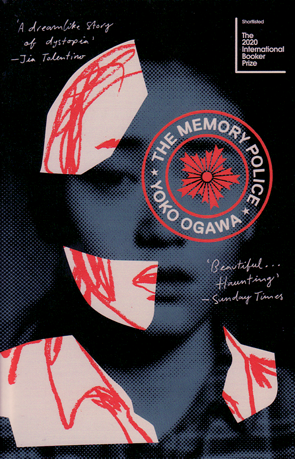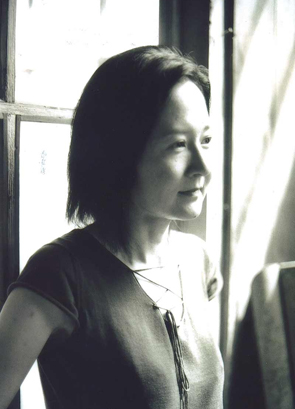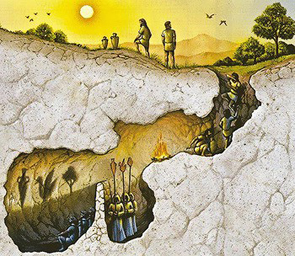The Memory Police has themes in common with other dystopian fiction like Orwell’s Nineteen Eighty-Four. There is a repressive regime, the memory police of the title, that has an agenda to control its population. In Nineteen Eighty-Four reality is controlled by the Party to exact total obedience to the State’s figurehead, Big Brother. In both novels the regime has the means by which assumed reality is controlled. Orwell’s State works through oppressive surveillance and by controlling the political message. Winston Smith, himself, is a cog in the State’s machine. He works at the Ministry of Truth, an aptly ironic name, since Winston’s time is employed in doctoring news stories and photographs to suit the State’s current political agenda, recalling the way Stalin’s political rivals were erased from the historical record through doctored photos and articles.
But this comparison serves to highlight what is so fundamentally different about Yoko Ogawa’s novel. Orwell’s dissection of the means of repressive control spawned a political adjective, ‘Orwellian’, often applied to specific situations because Orwell’s novel laid bare the mechanisms of this type of power. Ogawa’s novel, however, does not concern itself with the minutiae of state control. We don’t know where it is set, except that it is on an island, nor do we know when. We do not know who the memory police are or what their ultimate agenda is. We understand that they enforce the ideals of their state through searches, even state murder. But we don’t know how they are organised or to whom they answer. The narrator, another unknown since she is an unnamed novelist (almost no characters receive a proper name in the novel) has suffered the loss of her mother when she was young. The memory police took her mother away in a nice limousine. Her body was returned a week later. As a repressive regime, their methods of enforcement are fairly crude. What is more interesting is that what is enforced, the ‘disappearance’ of objects on the island, has a surreal or dreamlike quality. The word ‘disappearance’ is a misnomer to start with, at least in its ordinary usage. The old ferry man, for instance, lost his profession when boats were disappeared. The milliner in the narrator’s street suffered the same fate when hats were disappeared. Once something has been ‘disappeared’ the people of the island take those objects – hats, roses, ribbons – and destroy them. Once they have been destroyed, they are forgotten. Something large like the ferry man’s boat might exist physically for many years afterwards. In fact, the old man uses it as a place to live before the boat sinks. But the fact is, he has forgotten the true purpose of the boat and can no longer use it as a boat. Some people, a few at least, fail to forget things that have disappeared and must pretend that they have. These people are sought by the memory police because they hoard disappeared objects as the narrator’s mother once did, and some go into hiding to avoid detection. Their presence, and the objects they protect, are potentially subversive to the required forgetting. In this way, it might be easier to compare the novel to Bradbury’s Fahrenheit 451. Burning books, if you burn enough and deny the population access to books over generations, would serve to remove the utility of books and their contents from people’s minds. The ‘Firemen’ in Bradbury’s book, another wonderful piece of ironic nomenclature, burn secret hoardings of books, much as the memory police seek out those who do not forget and hoard disappeared objects on the island.
The purpose of these ‘disappearances’ is not explained, and the surreal quality of the story does not end there. When calendars are disappeared the people dutifully destroy their calendars. Standing in the street, a group of neighbours talk about the significance of this disappearance. With the calendars gone,
an old woman speculates, seemingly with the logic of a child, no matter how long we wait, we’ll never get a new month … so spring will never come.
Yet the oppressive snow continues to fall and the narrator tells us, No matter how long we waited, spring never came.
It’s a startling revelation which has been foreshadowed in previous disappearances. When roses are disappeared the people of the island pluck them and send their petals down the river. But we are aware that roses do not return in nature. There is a strange correlation between political decree and the natural world which cannot be explained by standard political discourse. Nature, and in turn, humanity, is shaped by the decree of the state. There is something peculiar and unnerving about this novel.
The story’s novelist narrator witnesses the repressive practices of the memory police. She sees a family forcibly removed from their building. And Professor Inui, the only named character, who has worked for the Memory Police and worries that his research in genetics may be used to identify those who cannot forget, seeks her help. Fearing for his family, he intends to flee and seek shelter, hidden in a safe house. When the narrator’s own editor, R, reveals he too has forbidden memories, the narrator has the old man make a hidden room in her house that can hide him. R moves in, leaving his pregnant wife, with only the old man and the narrator to keep him in touch with her.
The premise of The Memory Police is somewhat bizarre and would, of course, be impossible in a practical application. When an object is disappeared the narrator finds she can no longer remember its name, let alone what it was used for. The statues Professor Inui leaves her, created by her mother before she was killed, contain disappeared objects within which her mother was trying to preserve. But R’s attempts to use these objects to stimulate the narrator’s memory fail, and instead she, like others on the island, face a rapidly diminishing sense of her world and self. When novels are disappeared she finds it not only impossible to understand the few novels she keeps back from the burnings and hides with R, but she can no longer even write.
Clearly, Ogawa is not attempting to mirror any single example of political repression, or even the mechanics of repression as understood in quotidian reality. The Memory Police is operating at the level of metaphor and allegory. Just as Mohsin Hamid’s doors in Exit West were an allegory for the politics of migration (people could literally step through a door in the Middle East (or any other place that had a door) and find themselves in London (or just about any other place)), so too does Ogawa’s text confront us with an impossibility in order to shape our understanding of a more abstract problem. By breaking down the barriers to migration Hamid was able to explore assumptions about national identity, migration and security. Hamid’s story has its roots in Magic Realism. Similarly, there is a magical quality to the repression practised by the memory police that cannot be squared with political reality as we understand it. Ogawa’s allegory is not concerned with the mechanics of repression, but with its existential impact. Her narrative, instead, is interested in the question of whether a sense of self can be maintained against a fluid and irrational political environment. It’s a theme that extends at least back to Shakespeare. It’s like Petruchio telling Kate in The Taming of the Shrew that the sun is the moon (or the much forgotten Christopher Sly in the same play being convinced that he is a Lord). Insisting that reality is not so is an attack on a sense of self and one’s place in the world. Petruchio’s mission is to break Kate’s spirit and force her to conform to patriarchal power. In The Memory Police, the repression of memories is a slow fading of identity and agency.
Ogawa assumes a connection between objects and memory, and between memory and a sense of self. There is a constant emphasis in discussions between R and the narrator about her heart, about her soul and the hole that the loss of things opens on the island.
A heart has no shape, no limits. That’s why you can put almost any kind of thing in it, why it can hold so much. It’s much like your memory, in that sense.
So a heart is both physical and metaphysical, holding the memory of objects instead of their physical forms. When photographs are disappeared the narrator tells R:
Nothing comes back when I see a photograph. No memories, no response. They’re nothing more than pieces of paper. A new hole has opened in my heart, and there’s no way to fill it again.
The heart and by extension, the body, becomes both a physical and metaphysical space, as do objects on the island, which are both physical and conceptual because they exist (or not) in memory. When R attempts to reawaken the narrator’s memories with her mother’s objects, he is not merely trying to reconstruct her memory, but awaken her soul: I can’t just stand by watching as your soul withers
he tells her; It’s about waking up your sleeping soul
. Remembering, and therefore memory, are linked with an essential aspect of identity and self. To remove objects, allegorically, is to remove the memory, is to degrade the soul, and therefore the self. The narrator understands this intuitively when she writes in her novel about the typing student:
. . . things I thought were mine and mine alone can be taken away much more easily than I would have imagined. If my body were cut up in pieces and those pieces mixed with those of other bodies, and then if someone told me, “Find your left eye,” I suppose it would be difficult to do so.
This is central to the machinations of totalitarianism, and not so different to Orwell’s novel. It removes the sense of the individual. Orwell describes the process. Ogawa gives us an allegory of the vanishing self. The narrator’s character, the typing student with an attractive male teacher is drawn into a nasty trap. She becomes locked in a room of old, broken typewriters which have been imbued with the voices of their operators. Her sense of self is diminished by the broken machines about her and the room becomes a kind of cave, much like the cave in Plato’s allegory, where the prisoner lives a life of shadows, removed from the higher reality of conceptual Forms. The cave is a motif in the novel. The cavity in the heart and the hole in society are also caves. In Plato’s allegory, the cave was a benighted place in which the individual was kept from the true world and therefore a true understanding of themselves. The hidden room that houses R is described explicitly as a cave as well. But in this the situation is reversed. All reality, memory and the objects that can be hidden there exist as distinct from the wider world of the memory police, where reality is increasingly a shadow of what people like R remember. These are physical separations that manifest a connection between the physical world and the world of Forms, or as developed in later Christian thought, the soul.
Ogawa’s novel is a brilliant allegory of the impact of totalitarian thought upon the individual, and how it diminishes the richness of the world. Thoughts, memories and ideals are not merely abstract, but exist in our world in our bodies, through objects and actions. Ogawa has rejected a more traditional dystopian world building to focus upon the importance of this. Thoughts matter, memories matter and their free expression is important to our sense of self and individuality. This is a subtle and brilliant novel.

 RSS Feed
RSS Feed Facebook
Facebook Instagram
Instagram YouTube
YouTube Subscribe to our Newsletter
Subscribe to our Newsletter




No one has commented yet. Be the first!